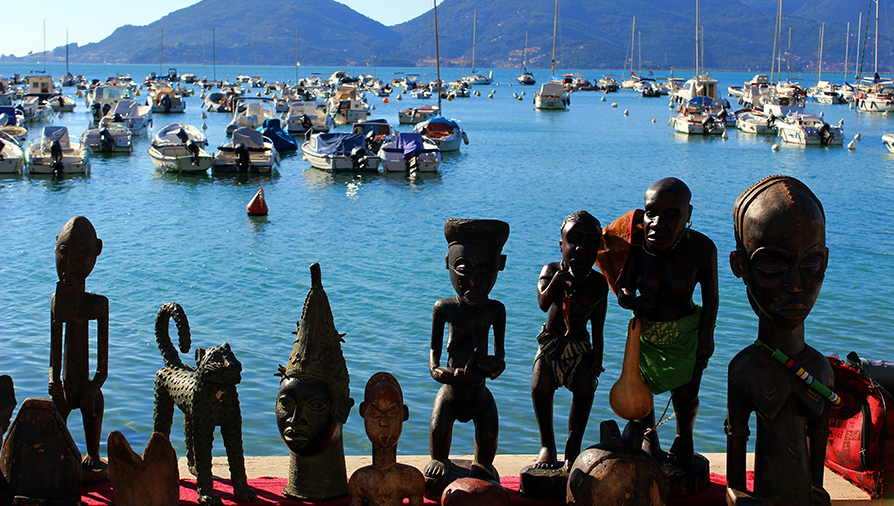
About the concentration in Literature, Culture, and Tradition
The humanities and social sciences help us to understand cultures through historical and contemporary lenses. In the Literature, Culture and Tradition concentration, you study and analyze the worldviews of different cultures, exploring cultural change and continuity over time and place. Through historical, literary, and cultural analysis of sources and artifacts, you develop research skills and learn to evaluate complex cultures and scenarios. You also apply the same analytical approaches to gain critical insights into current world challenges.
The concentration in Literature, Culture, and Tradition prepares you to:
- Understand significant historical themes and issues from the ancient world to the present, with an emphasis on encounters and exchanges among different cultures
- Interpret key literary and historical texts, from the perspectives of gender, religion, politics, and economics
- Combine perspectives from multiple disciplines, including religious studies, history, economics, cultural anthropology, sociology, literary studies, and politics
- Explore the history of religion from ancient societies to the present and how it informs contemporary cultures, politics, and societies
Courses
Students in the Bachelor of Applied Arts and Sciences degree will choose a concentration to tailor their undergraduate education to specific personal and professional goals. Courses within each concentration may be taken in any order, unless prerequisites are specified.
Students must complete foundational courses for the Bachelor of Applied Arts and Sciences degree. In addition, students in this concentration focus their studies by completing a total of 12 courses (12 c.u.*):
- 4 courses in 2 of the course blocks listed below (a total of 8 courses)
- 4 additional courses with input from an academic advisor
Course options
Classics course block
- CLSC 1000: Greek and Roman Mythology
- CLSC 1200: Archaeology of Greece and Rome*
- CLSC 2500: Ancient Cities*
Creative Writing course block
- CRWR 1010: The Craft of Creative Writing
- CRWR 1600: Modern and Contemporary US Poetry
- CRWR 2010: Poetry Workshop
- CRWR 2400: The Art of Editing
- CRWR 2500: Writing and Meditation
- CRWR 2600: Fiction Workshop
- CRWR 2800: Narrative Collage
- CRWR 3000: Writing About Place
- CRWR 3200: Screenwriting
- CRWR 3600: Advanced Nonfiction*
- CRWR 3700: Journalism
Digital Strategies course block
- DIGC 1200: Digital Literacy and Cultural Change
- DIGC 1600: A History of Digital Culture
- DIGC 2000: Coding Foundations for Digital Strategies
- ORGC 2010: Virtual Collaboration
- DIGC 2200: Design Thinking for Digital Projects
- DIGC 3200: Designing Critical Futures
- DIGC 3600: Applications of Digital Culture
- PROW 4010: Composing a Professional Identity
English Literature course block
- ENLT 1200: Literature, Culture, and Society*
- ENLT 1400: The History of English Literature in Eight Books*
- CRWR 1600: Modern and Contemporary US Poetry
- ENLT 3000: Radical Literature from the American Revolution to the Civil War*
Global and Regional Studies course block
- GLBS 1000: Introduction to Global Studies
- GLBS 2000: Globalization: Social, Economic, and Political Aspects
- GLBS 2800: Contemporary Issues in Global Health
- GLBS 3200: Latin America and the Caribbean: Themes, Trajectories and Disruptions
- GLBS 3800: Portraits of Contemporary Russia: Politics, Culture, and Conflict*
- CLCH 3100: Global Environmental Issues
- ICOM 1000: Intercultural Communication
- MODM 2000: Women and Gender in the Middle East
- MODM 3000: Religious Traditions of the Middle East*
- MUSI 2000: Contemporary African Music
Music Studies course block
Religion and Culture course block
- CLSC 1000: Greek and Roman Mythology
- RELC 2000: Gods, Ghosts, and Monsters
- RELC 2500: Asian Religions
Dialogue, Ethics, and Social Good
*This course may not be offered every academic year. Check the course page or our course guide to see when upcoming terms are added.
Courses are subject to change.
*Academic credit is defined by the University of Pennsylvania as a course unit (c.u.). A course unit (c.u.) is a general measure of academic work over a period of time, typically a term (semester or summer). A c.u. (or a fraction of a c.u.) represents different types of academic work across different types of academic programs and is the basic unit of progress toward a degree. One c.u. is usually converted to a four-semester-hour course.
Certificates related to Literature, Culture, and Tradition
See your advisor to explore earning the following certificates along with your degree. Note that these certificates are not earned automatically upon completing your degree; your advisor will help ensure that your academic plan meets the requirements of your preferred certificate
Careers related to Literature, Culture, and Tradition
The analytical and communications skills gained in the Literature, Culture and Tradition concentration are essential in any communications-related profession and in many business settings. Career options include:
- Copywriter
- Journalist
- Pre-law
- Public relations professional
- Communications officer
- Editor
- Publisher
- Technical writer
- Educator and librarian
- Grant writer
